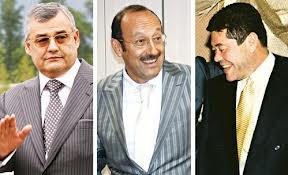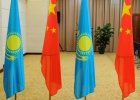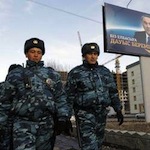 The most surprising thing about the founding trio of Eurasian Natural Resources Corporation – which controls some of Kazakhstan's most important assets – is that none is a native Kazakh.
The most surprising thing about the founding trio of Eurasian Natural Resources Corporation – which controls some of Kazakhstan's most important assets – is that none is a native Kazakh.
 The most surprising thing about the founding trio of Eurasian Natural Resources Corporation – which controls some of Kazakhstan's most important assets – is that none is a native Kazakh.
The most surprising thing about the founding trio of Eurasian Natural Resources Corporation – which controls some of Kazakhstan's most important assets – is that none is a native Kazakh.
 The two students –Dias Kadyrbaev and Azamat Tazhayakov -- are facing federal charges that they obstructed the investigation into the Boston Marathon bombings on April 15 by allegedly disposing of a computer and backpack belonging to accused bomber Djokhar Tsarnaev. A hearing in their case is scheduled for May 14. If convicted, they face five years in prison and up to $250,000 in fines. The Kazakhstani pair and Tsarnaev were constant companions for much of the past two years while taking classes at the University of Massachusetts-Dartmouth, roughly 60 miles south of Boston, according to a criminal complaint filed in US District Court on May 1.
The two students –Dias Kadyrbaev and Azamat Tazhayakov -- are facing federal charges that they obstructed the investigation into the Boston Marathon bombings on April 15 by allegedly disposing of a computer and backpack belonging to accused bomber Djokhar Tsarnaev. A hearing in their case is scheduled for May 14. If convicted, they face five years in prison and up to $250,000 in fines. The Kazakhstani pair and Tsarnaev were constant companions for much of the past two years while taking classes at the University of Massachusetts-Dartmouth, roughly 60 miles south of Boston, according to a criminal complaint filed in US District Court on May 1.
 On April 16, Kazakhstan's Oil and Gas Minister Sauat Mynbayev made a statement that drew much attention from both domestic and international media and should certainly have been widely commented on in several capitals, including Washington, Moscow, Beijing and New Delhi. After walking out of a regular government meeting, Mynbayev officially confirmed China interest in the Kashagan's oil project. This vast and complex undertaking in the Kazakhstani sector of the Caspian Sea has already cost its investors over $116 billion by August 2012, ahead of the Gorgon and Ichthys gas projects in Australia worth $57 billion and $43 billion, respectively (Newskaz.ru, April 16; The Astana Times, January 11; CNN Money, August 27, 2012)
On April 16, Kazakhstan's Oil and Gas Minister Sauat Mynbayev made a statement that drew much attention from both domestic and international media and should certainly have been widely commented on in several capitals, including Washington, Moscow, Beijing and New Delhi. After walking out of a regular government meeting, Mynbayev officially confirmed China interest in the Kashagan's oil project. This vast and complex undertaking in the Kazakhstani sector of the Caspian Sea has already cost its investors over $116 billion by August 2012, ahead of the Gorgon and Ichthys gas projects in Australia worth $57 billion and $43 billion, respectively (Newskaz.ru, April 16; The Astana Times, January 11; CNN Money, August 27, 2012)
 After two Kazakh students are charged with disrupting the investigation into the Boston bombing, residents from Kazakhstan defend their compatriots. The surviving Boston Marathon bombing suspect exchanged text messages with a friend who had become suspicious after seeing what looked like a familiar face on television, authorities say. That friend and two others now stand accused of aiding the suspected bombers.
After two Kazakh students are charged with disrupting the investigation into the Boston bombing, residents from Kazakhstan defend their compatriots. The surviving Boston Marathon bombing suspect exchanged text messages with a friend who had become suspicious after seeing what looked like a familiar face on television, authorities say. That friend and two others now stand accused of aiding the suspected bombers.
 "With China having already cornered about 40 per cent of this country's hydrocarbon assets, India's assessment is that it can get a chunk of the remaining portion if New Delhi plays its political and diplomatic cards right," The Hindu writes.
"With China having already cornered about 40 per cent of this country's hydrocarbon assets, India's assessment is that it can get a chunk of the remaining portion if New Delhi plays its political and diplomatic cards right," The Hindu writes.
 The “Church of Silence” is still a reality in this former Soviet country, where faithful still face repression. From Stalin’s gulags to censored books. “Religious freedom is non-existent” in Kazakhstan, international organisations complain, as the persecution of religious minorities intensifies. Members of religious communities and human rights defenders have said there is no freedom of faith in the country.
The “Church of Silence” is still a reality in this former Soviet country, where faithful still face repression. From Stalin’s gulags to censored books. “Religious freedom is non-existent” in Kazakhstan, international organisations complain, as the persecution of religious minorities intensifies. Members of religious communities and human rights defenders have said there is no freedom of faith in the country.
 The uncle of Boston's two Tsarnaev brothers worked for the CIA-front organisation called USAID.
The uncle of Boston's two Tsarnaev brothers worked for the CIA-front organisation called USAID.